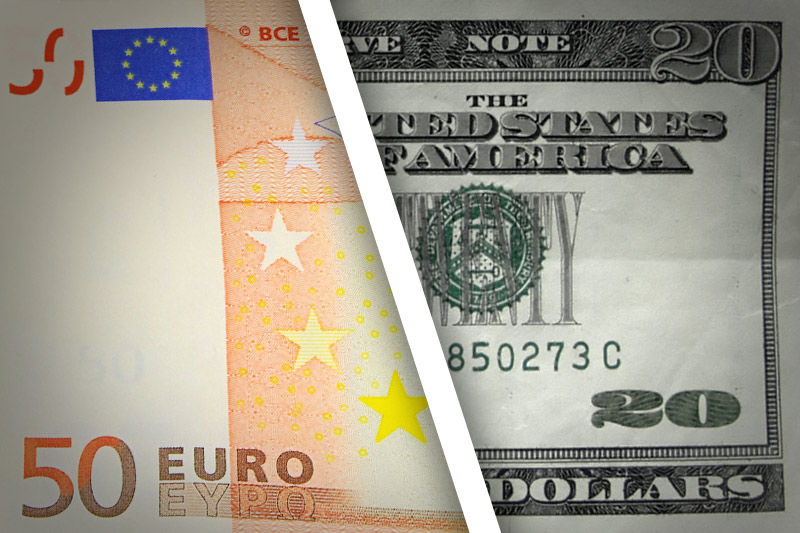Investing.com - The euro trimmed losses against the U.S. dollar on Friday, after the release of better-than-forecast U.S. gross domestic product data, although concerns over the financial crisis in Greece limited the single currency's gains.
EUR/USD pulled away from 1.2884, the pair's lowest since October 11, to hit 1.2927 during European afternoon trade, still down 0.05%.
The pair was likely to find support at 1.2824, the low of October 11 and resistance at 1.2978, the high of October 15.
In a preliminary report, the Bureau of Economic Analysis said that U.S. GDP rose to a seasonally adjusted annual rate of 2.0% in the third quarter, from 1.3% in the previous quarter.
Analysts had expected U.S. gross domestic product to rise 1.9% in the last quarter.
Sentiment on the euro remained vulnerable however, amid concerns over Greece's financial troubles after a report from the International Monetary Fund said Greek debt would be above the target agreed with international lenders.
The Greek government responded by saying that a deal on Athens' latest austerity package was being held up by opposition from a coalition ally.
Markets were also jittery amid ongoing uncertainty over when Spain will request a bailout and trigger the European Central Bank's bond-buying programme.
The euro was steady against the pound with EUR/GBP dipping 0.02%, to hit 0.8022.
Also Friday, a Gfk report showed that its consumer climate index for Germany improved unexpectedly to 6.3 in October from a reading of 6.1 the previous month.
Analysts had expected the index to tick down to 5.9 in October.
A separate report showed that Spain's unemployment rate rose to 25.0% in the second quarter, from a rate of 24.6% the previous quarter, barely beating expectations for a rise to 25.1%.
- English (UK)
- English (India)
- English (Canada)
- English (Australia)
- English (South Africa)
- English (Philippines)
- English (Nigeria)
- Deutsch
- Español (España)
- Español (México)
- Français
- Italiano
- Nederlands
- Português (Portugal)
- Polski
- Português (Brasil)
- Русский
- Türkçe
- العربية
- Ελληνικά
- Svenska
- Suomi
- עברית
- 日本語
- 한국어
- 简体中文
- 繁體中文
- Bahasa Indonesia
- Bahasa Melayu
- ไทย
- Tiếng Việt
- हिंदी
Forex - EUR/USD trims losses after U.S. data, Greece concerns weigh
Published 10/26/2012, 09:54 AM
Updated 10/26/2012, 09:55 AM
Forex - EUR/USD trims losses after U.S. data, Greece concerns weigh

Latest comments
Install Our App
Risk Disclosure: Trading in financial instruments and/or cryptocurrencies involves high risks including the risk of losing some, or all, of your investment amount, and may not be suitable for all investors. Prices of cryptocurrencies are extremely volatile and may be affected by external factors such as financial, regulatory or political events. Trading on margin increases the financial risks.
Before deciding to trade in financial instrument or cryptocurrencies you should be fully informed of the risks and costs associated with trading the financial markets, carefully consider your investment objectives, level of experience, and risk appetite, and seek professional advice where needed.
Fusion Media would like to remind you that the data contained in this website is not necessarily real-time nor accurate. The data and prices on the website are not necessarily provided by any market or exchange, but may be provided by market makers, and so prices may not be accurate and may differ from the actual price at any given market, meaning prices are indicative and not appropriate for trading purposes. Fusion Media and any provider of the data contained in this website will not accept liability for any loss or damage as a result of your trading, or your reliance on the information contained within this website.
It is prohibited to use, store, reproduce, display, modify, transmit or distribute the data contained in this website without the explicit prior written permission of Fusion Media and/or the data provider. All intellectual property rights are reserved by the providers and/or the exchange providing the data contained in this website.
Fusion Media may be compensated by the advertisers that appear on the website, based on your interaction with the advertisements or advertisers.
Before deciding to trade in financial instrument or cryptocurrencies you should be fully informed of the risks and costs associated with trading the financial markets, carefully consider your investment objectives, level of experience, and risk appetite, and seek professional advice where needed.
Fusion Media would like to remind you that the data contained in this website is not necessarily real-time nor accurate. The data and prices on the website are not necessarily provided by any market or exchange, but may be provided by market makers, and so prices may not be accurate and may differ from the actual price at any given market, meaning prices are indicative and not appropriate for trading purposes. Fusion Media and any provider of the data contained in this website will not accept liability for any loss or damage as a result of your trading, or your reliance on the information contained within this website.
It is prohibited to use, store, reproduce, display, modify, transmit or distribute the data contained in this website without the explicit prior written permission of Fusion Media and/or the data provider. All intellectual property rights are reserved by the providers and/or the exchange providing the data contained in this website.
Fusion Media may be compensated by the advertisers that appear on the website, based on your interaction with the advertisements or advertisers.
© 2007-2025 - Fusion Media Limited. All Rights Reserved.